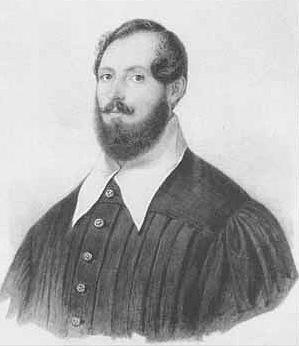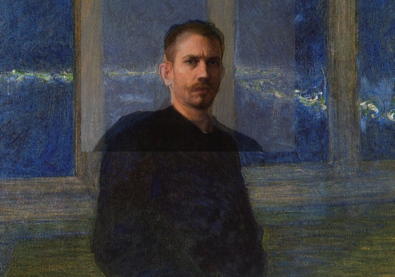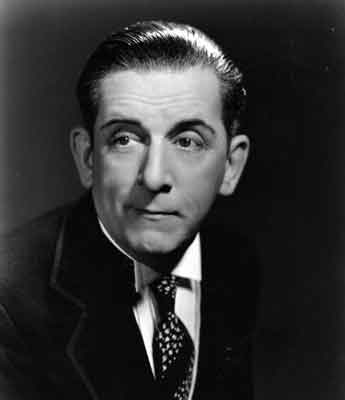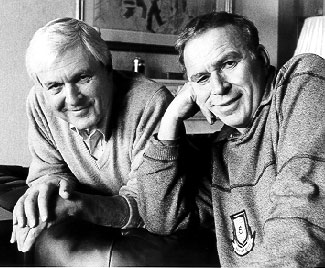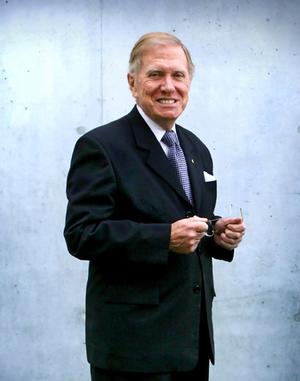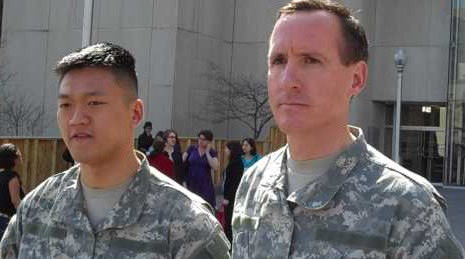|
presents THIS DAY IN GAY HISTORY based on: The White Crane Institute's 'Gay Wisdom', Gay Birthdays, Gay For Today, Famous GLBT, glbt-Gay Encylopedia, Today in Gay History, Wikipedia, and more …
Collected by Ted March 18 [{(o)}]|[{(o)}]|[{(o)}]|[{(o)}]| [{(o)}]|[{(o)}]
1790 – On this date the French writer, playwright, poet and traveler Astolphe-Louis-Léonor, Marquis De Custine was born (d.1858). Born in the castle of Niderviller in Lorraine as Astolphe Louis Léonor de Custine, he was a French aristocrat and writer best known for his travel writing, in particular his account of his visit to Russia in 1839 Empire of the Czar: A Journey Through Eternal Russia. This work documents not only Custine's travels through the Russian empire, but also the social fabric, economy, and way of life during the reign of Nicholas I. Custine was raised by his strong-willed mother and saw a lot of the writer Chateaubriand, who was his mother's lover. Custine was given an excellent education and seemed to be headed towards a life in society. He spent time in the diplomatic service, attending the Congress of Vienna, and even accepted a military commission. In the early 1820s, Custine went along with a marriage arranged by his mother. The Marquis, later to admit his homosexuality and to live openly with a male lover, was genuinely fond of his wife and had a son with her, but she died after only a few years of marriage. Still, during the marriage he met and established a romantic relationship with an Englishman, Edward Saint-Barbe, who remained his life companion. On October 28, 1824, after his wife had died, Custine's life was irrevocably changed. That night, Custine's unconscious body was found in the mud outside of Paris, stripped to the waist, beaten, and robbed. The attack had been carried out by a group of soldiers with one of whom Custine allegedly had attempted to have a sexual encounter. The exact reason for the attack was never proven. Nevertheless, news of the incident quickly spread around France — "From this time on to the end of his life Custine would figure, in the cruel gossip of the day, primarily as France's most distinguished and notorious homosexual."Even though the literary salons, as opposed to the society salons, remained open to Custine, many people who were friendly with him sneered at him behind his back. His diplomatic career was also cut short by this incident. That same year, several family friends would die, Custine's infant son by his late wife, and his mother. In the years after this tragedy, Custine became very pious. Custine gravitated toward the Romantic movement and spent the next few years writing poetry and novels. Custine wrote one play and purchased a theater to produce it, but the play closed after three performances. None of his literary works received much attention. Heinrich Heine called Custine "un demi-homme des lettres" (a half-man of letters). Custine eventually discovered that his knack was for travel writing. He wrote a decently received account of a trip to Spain and was encouraged by Honoré de Balzac to write accounts of other "half-European" parts of Europe, like southern Italy and Russia. La Russie en 1839 went through six printings and was widely read in England, France, and Germany, but was banned in Russia.
1796 – New Jersey passes its first sodomy law in nearly a century and eliminates the death penalty. The maximum sentence is set at 21 years at solitary and hard labor. The law still applies only to males.
1862 – Eugene Jansson born in Stockholm (d.1915), was a Swedish painter. His parents were both born in Stockholm. His younger brother, Adrian Edward Jansson was also an artist. Jansson's parents belonged to a social stratum straddling the working and the lower middle class, but they were interested in art and music and ambitious for their two sons, Eugène and his younger brother Adrian. Eugène went to the German School in Stockholm and took piano lessons. An attack of scarlet fever at the age of fourteen caused him health issues from which he suffered for the rest of his life, including bad eyesight and hearing and chronic kidney problems. Jansson painted several large landscape paintings of Stockholm motifs, often in the evening or night mood, often from his home at o.2 Carpenter Street, maintained in an overall bluish tint. He is therefore known as Blue Painter. He painted scenes like long, winding lines of street lamps reflected in the water. Later he turned increasingly to painting strong, naked male figures, who sunbathe on docks or in athletic swimming exercises. The artist was suffering from a kidney disease that forced him to regular gymnastics and swimming. Through contacts he got access to the navy bathhouse on Skeppsholmen where he found plenty of models for his figurative paintings. These canvases are characterized by a fresh and sunny atmosphere, with careful study of the anatomy. Behind these paintings of naked men was something deeper than just an interest in the human body. Jansson was gay, and lived during a time when it was forbidden by law to perform homosexual acts. The men who posed for him were often men he opened sexual relations with, so the pictures were a risk but also a way for him to live out whatever was within him. 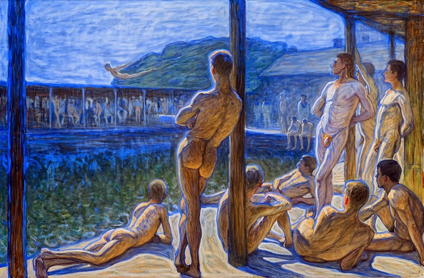 The Navy Bathhouse (Click for larger) He died June 15, 1915 at the Stockholm Nursing Home in Skara. Art historians and critics have long avoided the issue of any possible homoerotic tendencies in the later phase of his art, but later studies have established that Jansson was certainly homosexual and appears to have had a relationships with at least one of his models. His brother, Adrian Jansson, who was himself homosexual and survived Eugène by many years, burnt all his letters and many other papers, possibly to avoid scandal (homosexuality was illegal in Sweden until 1944).
1886 – Edward Everett Horton, American actor (d.1970); There's no way to think of the comedies of the 20's, 30's and 40's without recollecting this lanky, bushy-browed Nervous Nellie. Of all the sissified comedians of the past, he was unquestionably the best, certainly the most eccentric and humanly complicated. Watch him in comic support of Astaire and Rogers in Top Hat (1935), where his attempts at getting out of the clutches of Alice Brady provide small gems of gay sexual innuendo and perfect timing. The actor is best known for his work as a character actor in supporting roles. Some of his noteworthy films include The Front Page, Trouble in Paradise, the aforementioned Top Hat (one of several Astaire-Rogers movies Horton was in), Holiday, Lost Horizon, Here Comes Mr. Jordan, Arsenic and Old Lace and A Pocketful of Miracles. In private life he lived with his mother on a large estate named "Belly Acres." One can almost hear him arguing, in that firm but nervous way of his, "Now mother. I like that name, and I don't care that you find it undignified. Belly Acres it is and Belly Acres is stays." Horton's companion for many years was actor Gavin Gordon, who was 15 years his junior. They both appeared (but shared no scenes) in only one film, Pocketful of Miracles (1961). Beginning in 1959 he narrated the "Fractured Fairy Tales" segment of the Rocky & Bullwinkle cartoon show. In 1965 he played the medicine man, Roaring Chicken, in the sitcom F Troop. He parodied this role, portraying "Chief Screaming Chicken" on Batman as a pawn to Vincent Price's "Egghead" in the villain's attempt to take control of Gotham City. His last role, as a moribund tobacco company president in a wheelchair, was in the motion picture Cold Turkey, released after his death.
1893 – On this date the soldier and iconic war poet Wilfred Owen was born (d.1918). Regarded by many as the leading poet of the First World War, his shocking, realistic war poetry on the horrors of trench and gas warfare was heavily influenced by his friend Siegfried Sassoon and sat in stark contrast to both the public perception of war at the time, and to the confidently patriotic verse written earlier by war poets such as Rupert Brooke. In 1915, he enlisted in the army and, after training, was commissioned as a second lieutenant in the Manchester Regiment. Owen started the war as a cheerful and optimistic man, but he soon changed forever. Initially, he held his troops in contempt for their loutish behaviour, and wrote to his mother calling his company 'expressionless lumps'. However, Owen's outlook on the war was to be changed dramatically after two traumatic experiences. Firstly, he was blown high into the air by a trench mortar, landing in the remains of a fellow officer. Soon after, he became trapped for days in an old German dugout. After these two events, Owen was diagnosed as suffering from shell shock and sent to Craiglockhart War Hospital in Edinburgh for treatment. While recuperating there he met a fellow poet with whom he would be forever associated - Siegfried Sassoon. Although he had written poetry for years, his style was changed dramatically by the influence of Sassoon, who encouraged him to write from experience - this combined with his innovative use of rhyme, and his best work was a direct result - incl. Dulce et Decorum Est, Anthem for Doomed Youth & Strange Meeting. There is no evidence that their relationship was closer than friendship, but Owen's letters suggest that he was in love with Sassoon. Owen returned to active duty in France in the summer of 1918. He could have chosen to remain on home-duty, but seems to have taken a symbolic decision to return to the front in place of Sassoon, who had been invalided out of the war by his injuries, that he might continue to document the horrors of war. Wilfred Owen was killed in battle while attempting to cross the Sambre-Oise Canal with his unit, on November 4th 1918. The war ended a week later. His mother received the telegram on Armistice Day. News of his death reached home as the town's church bells declared peace.He was 25 years old. He was posthumously awarded the Military Cross. Robert Graves and Sacheverell Sitwell (who also personally knew him) have stated Owen was homosexual, and homoeroticism is a central element in much of Owen's poetry. Through Sassoon, Owen was introduced to a sophisticated homosexual literary circle which included Oscar Wilde's friend Robbie Ross, writer and poet Osbert Sitwell, and C. K. Scott-Moncrieff, the translator of Proust. This contact broadened Owen's outlook, and increased his confidence in incorporating homoerotic elements into his work. Historians have debated whether Owen had an affair with Scott-Moncrieff in May 1918; Scott-Moncrieff had dedicated various works to a "Mr W.O.", but Owen never responded. The account of Owen's sexual development has been somewhat obscured because his brother, Harold Owen, removed what he considered discreditable passages in Owen's letters and diaries after the death of their mother. Owen also requested that his mother burn a sack of his personal papers in the event of his death, which she faithfully did.
1916 – Virginia outlaws oral sex between persons of the same sex only, while retaining anal sex as a crime between persons regardless of sex.
1927 – John Kander is the American composer of a series of musical theatre successes as part of the songwriting team of Kander and Ebb. He began his Broadway career as substitute rehearsal pianist for West Side Story. The stage manager for West Side Story then asked Kander to play the auditions for her next show, Gypsy. During the auditions Kander met the choreographer, Jerome Robbins, who then suggested that Kander actually write the dance music for the show in 1959. After that experience, he wrote dance arrangements for Irma la Douce in 1960. His first produced musical was A Family Affair.In 1962 he teamed up with Fred Ebb to write Flora the Red Menace, in which Liza Minnelli made her initial Broadway appearance. In the same year rising star Barbra Streisand recorded two of the duo's songs, My Coloring Book and I Don't Care Much. It launched the pair on their career. Kander and Ebb have since been associated with writing material for Liza Minnelli and for Chita Rivera, and have produced special material for their appearances live and on television. Kander has also written a number of film scores, notably Kramer vs. Kramer (1979) and Places in the Heart (1984). Kander and Ebb's hugely succcessful musicals Cabaret and Chicago have been made into films and successfully revived in recent years and are both now acknowledged as iconic landmarks within the landscape of musical theatre. If the Kander/Ebb relationship was often misunderstood as romantic, it's not hard to see why: the two men worked in the theater, neither had a wife, and over the course of their 42-year collaboration their last names had all but fused into one, a songwriting entity that Mr. Kander, now in his 80s, calls "Kandernebb." They spoke of their professional rapport in spousal terms, saying they understood exactly how to please each other, that working with someone else would feel like adultery. On the road with a show in tryouts, they'd often slip away from rehearsal, hole up in a hotel room and (as one colleague described it) emerge 20 minutes later, flushed and happy. It was the completion of a new song, of course, making them happy. Fred Ebb died, at 76, on Sept. 11, 2004. Wnen John Kander got the phone call, he "experienced what he called "a kind of numbness: You hear the words, take them in but don't." For a few hours, not knowing what else to do, he sat quietly in his country house in upstate New York until his actual life partner, Albert Stephenson, a dancer and choreographer, suggested they go kayaking on the lake. "It was a beautiful, sunny day," Kander recalled. "Nothing but silence and blue sky and the buzzing of insects on clear, glittering water as we glided across. And eventually I turned to Albert and said, 'Fred would have just hated this!' " Suspicious of sunniness, and even of the sun, Mr. Ebb had visited that country house only once, and sat the whole time facing away from the view. Embodying all the stereotypes of a neurotic New Yorker, he seemed uncomfortable with and sometimes envious of Mr. Kander's optimism, and especially the serenity of the countryside. His first musical without Fred Ebb in many years, The Landing, with book and lyrics by Greg Pierce, premiered at the Vineyard Theatre, kicking off their 2013–2014 season. Kander's newest musical, Kid Victory, also with Greg Pierce, had its world premiere February 28, 2015 at the Signature Theatre in Arlington, VA.
1931 – John Fraser (d.2020) was a British actor who transcended his working-class Glasgow roots to become a matinee idol, before taking a sidestep out of the limelight. In a colourful career, he showed star quality in a stream of top-flight films following his breakout role in The Dam Busters (1955). At his most famous, Fraser was dubbed the most handsome man in Britain. As well as receiving a BAFTA nomination for Best Actor in The Trials of Oscar Wilde (1960), Fraser published several books, and a brief brush with pop stardom ran parallel with his early acting career. Fraser laid bare the ups and downs of his life with flamboyant abandon in his hugely entertaining memoir, Close Up (2004). There were richly descriptive tales of Fraser’s brief but intense affair with Soviet ballet star Rudolf Nureyev, and of being invited to Dirk Bogarde’s mansion, where Bogarde kept a Harley Davidson motorcycle in his loft. Bogarde proceeded to show Fraser how he got his kicks, giving it full throttle as he straddled the bike while watching a film poster of himself clad in black leather. This followed the pair working together in Ralph Thomas’ Second World War-set prisoner of war drama, The Wind Cannot Read (1958). The film also starred Ronald Lewis, who came to blows with Fraser after taunting him about his sexuality. At a time when homosexuality was still illegal in Britain, Fraser was never comfortable with the pretence of being forced to live a double life. His TV career began in 1952, playing David Balfour in Joy Harrington’s six-part adaptation of Robert Louis Stevenson’s adventure yarn, Kidnapped. This led to a couple of uncredited appearances in Titanic (1953) and The Desert Rats (1953). He played the male lead in a BBC production of Troilus and Cressida (1954) prior to appearing in The Dam Busters and Touch and Go (1955). Following his BAFTA-nominated turn in The Trials of Oscar Wilde as Wilde’s lover, Bosie, Fraser acted alongside Alec Guinness in James Kennaway’s searing adaptation of his novel, Tunes of Glory (1960). Fraser was last seen regularly on British screens as Dr. Lawrence Golding in all 47 episodes of local surgery-set drama, The Practice (1985). His final appearance came in Truth or Dare (1996), a BBC Scotland-produced Screen One feature. Fraser moved to Tuscany, before returning to London, where Close Up’s freewheeling candour raised his profile in a way that drew attention to one of the most charismatic but neglected presences in British cinema. He died in 2020, survived by his partner of 42 years, Rodney Pienaar.
1939 – Michael (Donald) Kirby is an Australian retired judge, jurist, and academic who is a former Justice of the High Court of Australia, serving from 1996 to 2009. Michael Kirby has been open about being gay since 1999, when he came out in Who's Who in Australia by naming Johan van Vloten as his long-term partner. Van Vloten, who migrated to Australia in 1963, has lived with Kirby since 1969. Kirby has often spoken publicly in support of gay rights. While President of the International Commission of Jurists he encouraged that organisation to give more consideration to human sexuality as an aspect of human rights, and as an Anglican he has expressed disappointment at his church's stance on gay rights. In 2002, at the Sydney Gay Games VI, Kirby was the keynote speaker at the opening ceremony. "The movement for equality is unstoppable. Its message will eventually reach the four corners of the world," he told a crowd of 35,000. In 2006, he attended the International Conference on LGBT Human Rights in Montreal, presiding over the Asia-Pacific Plenary. In November 2007, Kirby accused the Anglican and Catholic archbishops of Sydney, Peter Jensen and George Pell respectively, of hindering the acceptance of gay people in Australian society, stating that homophobia was "reinforced even to this day by religious instruction, and it has to be said, religious instruction from the two archbishops of Sydney." Kirby also expressed disappointment in his "minority of one" status among his High Court of Australia colleagues, and indicated that "some of the justices perhaps have less liberal views than I have." One of Kirby's most high-profile critics is Liberal Senator Bill Heffernan. In 2002, Heffernan used parliamentary privilege to accuse Kirby of misusing government resources to solicit under-age male prostitutes. However, the evidence Heffernan produced to support this claim was swiftly discovered to be a forgery, and Heffernan was censured by the Senate. After Heffernan eventually apologised for making the allegations, Kirby promptly responded: "I accept Senator Heffernan's apology and reach out my hand in a spirit of reconciliation. I hope my ordeal will show the wrongs that hate of homosexuals can lead to."
1971 – Idaho becomes one of the earliest states to repeal its sodomy law, but outrage from the Mormon and Catholic Churches causes a panic in the state. In 1972, the entire old code, with the felony sodomy law, is reinstated, making Idaho the first state ever to reinstate a repealed sodomy law.
Born and raised in Los Angeles California, Levine began his musical career in 1994, when he co-founded the alternative rock band Kara's Flowers, of which he was the lead vocalist and guitarist. The band split up after their only album, The Fourth World (released in 1997), which did not gain popularity. In 2001, the group was reformed – with guitarist James Valentine joining the line-up – and began a new, musical chapter, changing their name to Maroon 5. In 2002, the band released their first album, Songs About Jane, which went multi-platinum in the US. Since then, they have released four more albums, It Won't Be Soon Before Long (2007), Hands All Over (2010), Overexposed (2012) and V (2014). As part of Maroon 5, Levine has received three Grammy Awards, two Billboard Music Awards, two American Music Awards, an MTV Video Music Award and a World Music Award. Since 2011, Levine has served as a coach on NBC's reality talent show The Voice. The winners of the first, fifth and ninth seasons, Javier Colon, Tessanne Chin and Jordan Smith, were on his team. In 2012, he made his acting debut as a recurring character in the horror television show American Horror Story: Asylum for the series' second season. He also starred in the film Begin Again. Levine, whose brother openly identifies as being gay, is an outspoken supporter of same-sex marriage and LGBT rights. In 2011, he made a video on Maroon 5's official YouTube account in support of the It Gets Better Project: (2min 27sec) In January 2012, he announced that Maroon 5 had changed the location of their post-Grammy Awards show because of the "unnamed Los Angeles restaurant's backing of Proposition 8".
1982 – Police raid a Washington, D.C. male escort service called "Friendly Models" and cart away more than a dozen boxes of business records, including the names and addresses of several hundred of the service's clients.
1986 – Simon Curtis is an American actor, singer-songwriter, and record producer. He first gained recognition for his role as Royce Du Lac in the 2009 film Spectacular! before venturing into pop music, during which he released his debut extended play Alter Boy in 2008, his debut full-length studio album, 8Bit Heart in 2010, and in 2011, he released his second studio album (and first commercial release) RA; the two latter releases were released through his independent label, BoyRobot Records. Simon Curtis was born in the state of Michigan, United States, and spent his earliest years in Alpena. His family later moved to Tulsa, Oklahoma. At the age of ten, he was diagnosed with leukemia. He graduated from Jenks High School in 2004. Curtis earned a coveted role in the national tour production of the musical Joseph and the Amazing Technicolor Dreamcoat. Simon is openly gay. Curtis released a free EP, WWW, on October 12, 2013. It consisted of 8 new songs and three alternate covers. Although his sexuality had been questioned beforehand, it was the criticism towards this album's artwork for being "too gay" that lead him to defend himself saying "Love that I'm getting so much heat for my new album artwork being "too gay" on National Coming Out Day." He followed this up with, "With that said, I am gay."
1994 – A Florida appellate court overturns a sex conviction for acts in closed restroom stalls, finding a right to privacy therein.
2010 – Lieutenant Dan Choi and Captain James Pietrangelo II, two outed military officers, handcuffed themselves to the White House gates in an act of public protest against the "Don't Ask, Don't Tell" policy, which forbid Gay service members from serving openly in the U.S. military. Specifically they were protesting the Obama administration's intransigent foot-dragging on the issue after having campaigned on removing the policy that had been signed into law by Bill Clinton.
[{(o)}]|[{(o)}]|[{(o)}]|[{(o)}]| [{(o)}]|[{(o)}] TODAY'S GAY WISDOM: Wilfred Owen: Dulce et Decorum Est Bent double, like old beggars under sacks, Gas! GAS! Quick, boys!-- An ecstasy of fumbling, In all my dreams, before my helpless sight, If in some smothering dreams you too could pace *It is sweet and glorious to die for one's country.
[{(o)}]|[{(o)}]|[{(o)}]|[{(o)}]| [{(o)}]|[{(o)}] |
